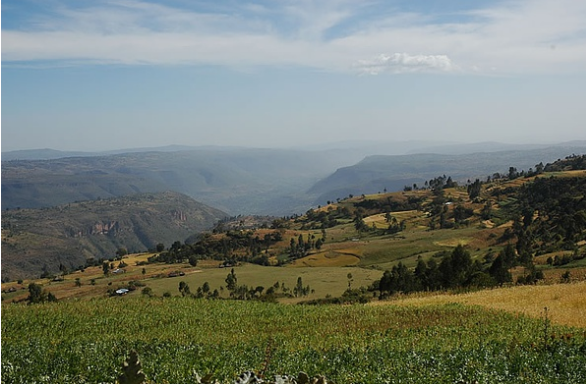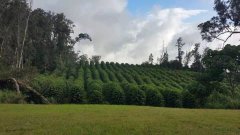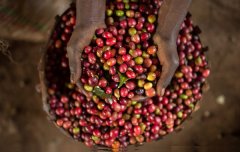Suggestion on hand-washing parameters of Cabaret Coffee Fine Coffee beans in Kenyan Water-washed AA Klinga producing area

For professional baristas, please follow the coffee workshop (Wechat official account cafe_style)
Hand-washed hole fish. 15g powder, medium fineness grinding (small Fuji ghost tooth cutter 3.5grinding), v60 filter cup, 91mi 93 degrees water temperature, first water injection 30g water, carry on steaming for 27 seconds, injection to 105g water cut off, wait for powder bed water to half, then water injection, slow water injection until 225g water volume, no water powder ratio at 1:15, extraction time at 2:00
Country: Kenya
Grade: AA
Producing area: Klinaga producing area
Altitude: 1550-1750 m
Soil quality: red phosphate soil
Treatment method: Kenyan double washing treatment
Variety: SL 28, SL 34
Treatment plant: hole fish treatment plant
Producer: Kabare Cooperative
Flavor: grapefruit green tea, citrus, covered black plum
Kenya, located in East Africa, is one of the major coffee producing countries. More than 6 million people in the country are engaged in the coffee industry, mostly in the form of a combination of small farmers and cooperatives.
Coffee trees in Kenya are mostly planted at 1400 m-2000 m above sea level, and the growth areas include Ruiri, Thika, Kirinyaga and Mt. Kenya West, Nyeri, Kiambu and Muranga. Mainly in the foothills of Mt.Kenya and Aberdare.
There are many producing areas in Kenya that strive to preserve the native forest ecosystem, protect the natural gene pool, support the reproduction of wild coffee varieties and breed a variety of coffee trees.
In 1930, the unique Kenyan varieties SL28 and SL34, which were cultivated and named by the "Scott Laboratories" laboratory, were born under such a good environment.
According to botanists in SL laboratory, SL28 and SL34 are genetic variants. Among them, SL28 has a mixed pedigree of French missionaries, mocha and Yemeni Tibica. The goal of cultivating SL28 was to mass produce coffee beans with high quality and resistance to diseases and insect pests.
Although the yield of SL28 was not as high as expected the copper leaf color and broad bean-shaped beans have great sweetness balance and complex flavor as well as significant citrus and black plum characteristics. SL34 is similar to SL28 in flavor, with a heavier, fuller and cleaner finish than SL28, except for the complex acidity and great sweetness of the finish. SL34 has French missionaries, bourbon, and more Tibica ancestry. Dou looks similar to SL28, but is more adaptable to sudden heavy rain. It is these two important varieties that lead us to the unique Kenyan style: strong acidity, rich taste and beautiful balance.
Flavor description: strong dry and wet aromas of lemon and plum, shallow baking with a variety of amazing aromas such as flower and lemon, as well as the sour, sweet and juicy smell of grapefruit green tea and citrus juice. slightly deepen the baking and then have a variety of flavors of honey and covered black plum, while the aftertaste is the pleasing sweet and sour taste of many green tea.
This Kenyan branch comes from the Kabare cooperative hole fish treatment plant in Khabare, Kenya, and grows in Manyata-Embu County on the eastern slopes of the Kenyan Mountains from 1550 to 1750. The variety is the classic Kenyan SL28,SL34, coupled with the large temperature difference between day and night there, and the red phosphate soil in Kenya, making sweet and sour the main Kenyan flavor tone.
The fresh coffee fruits of this batch of Kong fish AA were picked and processed by 250 farmers in the Kongyu treatment plant under the jurisdiction of the Kabare farmers' cooperative. After peeling, fermenting and cleaning the coffee from the nearby Kongyu River, the coffee will be used in an African drying bed for drying. Every picking season, farmers deal with nearly 300 tons of fresh coffee fruit. After the processing is completed, it will participate in the coffee auction in Nairobi every Wednesday, which, once selected by legal exporters, will be shipped to consumer markets around the world.
In every Kenya before, we especially like to pursue those angular, strong and sour fruit, and this Kenya makes me feel gentle, like facing the sea, with a breeze blowing.
Factory name: Qianjie Coffee Factory address: Guangzhou Yuexiu District Baoan Qianjie 10 Qianjie Cafe manufacturer contact Information: 020-38364473 shelf life: 90 net content: 227g packing: raw maturity of bulk coffee beans: whether coffee beans contain sugar: sugar-free origin: Kenyan coffee types: other roasting degree: light roasting
Important Notice :
前街咖啡 FrontStreet Coffee has moved to new addredd:
FrontStreet Coffee Address: 315,Donghua East Road,GuangZhou
Tel:020 38364473
- Prev

Stories and allusions of PB round beans and boutique coffee beans at Kimmel Manor, Papua New Guinea
Professional baristas Please follow the Coffee Workshop (Wechat official account cafe_style) in recent years, Papua New Guinea Coffee has begun to bring its own unique high-quality washed Arabica beans, representing Oceania to enter the ranks of specialtycoffee in the world. The coffee style of Papua New Guinea has the characteristics of full particles, moderate acidity and mellow taste. Papua New Guinea
- Next

Stories and allusions of Kenya washing Cabaret hole fish boutique coffee beans in AA Klinaga producing area
The exchange of professional baristas please follow the coffee workshop (Wechat official account cafe_style) in 1930, the unique Kenyan varieties SL28 and SL34 cultivated and named by Scott Laboratories laboratory were born in such a good environment. According to botanists in SL laboratory, SL28 and SL34 are genetic variants. Among them, SL28 has French missionaries, Mocha and Yemen.
Related
- Detailed explanation of Jadeite planting Land in Panamanian Jadeite Manor introduction to the grading system of Jadeite competitive bidding, Red bid, Green bid and Rose Summer
- Story of Coffee planting in Brenka region of Costa Rica Stonehenge Manor anaerobic heavy honey treatment of flavor mouth
- What's on the barrel of Blue Mountain Coffee beans?
- Can American coffee also pull flowers? How to use hot American style to pull out a good-looking pattern?
- Can you make a cold extract with coffee beans? What is the right proportion for cold-extracted coffee formula?
- Indonesian PWN Gold Mandrine Coffee Origin Features Flavor How to Chong? Mandolin coffee is American.
- A brief introduction to the flavor characteristics of Brazilian yellow bourbon coffee beans
- What is the effect of different water quality on the flavor of cold-extracted coffee? What kind of water is best for brewing coffee?
- Why do you think of Rose Summer whenever you mention Panamanian coffee?
- Introduction to the characteristics of authentic blue mountain coffee bean producing areas? What is the CIB Coffee Authority in Jamaica?

